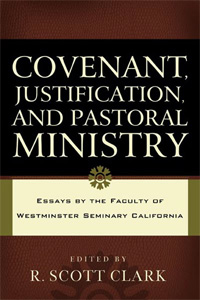Over the years of battling the moralists (Federal Visionists, Norman Shepherd et al) I’ve not always been certain whether the moralists understand the orthodox doctrine of justification and reject it or if they think they are really teaching it. Here’s a post . . . Continue reading →
Federal Vision
As I Was Saying
After much deliberation, prayer, and encourage from some friends and readers the HB is back. Thanks to a dear and loyal friend who did an amazing amount of work to make it happen. The last HB post was in May 2011. Much . . . Continue reading →
Sometimes Culture Includes Cult
Leila writes: “My husband and I planned, from the beginning, to send our children to private school, since we weren’t happy with the public schools in our area. Right before our oldest was ready to start kindergarten in the mid-90s, a new . . . Continue reading →
PCA Commission: There Should Be A Presumption of Guilt
The Standing Judicial Commission of the Presbyterian Church in America ruled that the Missouri Presbytery erred when it failed to find a strong presumption of guilt that [Teaching Elder] Jeffrey Meyers holds views contrary to the Westminster Standards (BCO 34-5) when it . . . Continue reading →
Heidelcast 3a: A Gentle Rebuke to Brother John (UPDATED)
UPDATE: added to the two Heidelcast episodes audio clips from the video linked below. § These episodes grew out of the decision Desiring God Ministries to invite the de facto leader of the self-described Federal Vision movement to speak at the 2009 DGM . . . Continue reading →
Heidelcast Episode 3b: Follow Up to DGM (Part 2)
Heidelcast episode #3: A Gentle Rebuke to Brother John (pt 2)
HB Classic: Three Ways of Relating to the One Covenant of Grace
[This post was first published in 2007 on the HB and is republished in response to some recent comments here] Sometime back the question was raised: We know that there are at least two categories of people within Scripture, the elect, and . . . Continue reading →
What Henk Navis Means to Me
Unlike Father Neuhaus, I guess few readers of this space will know who Henk Navis was, but he died today. Henk did not participate in any famous negotiations with anyone. He did not leave one communion for another. He wasn’t celebrated or . . . Continue reading →
The Leithart Verdict Is In: The News is Not Good for Orthodoxy
Peter Leithart is a teaching elder (TE) in the Presbyterian Church in America. Until recently he was a minister, laboring outside the bounds of his presbytery, in a Communion of Reformed Evangelical Churches (CREC) congregation in Moscow, ID. The CREC is the . . . Continue reading →
The Moralists Will Be Back
An HB Classic
It is an historical fact that moralism (the confusion of justification with sanctification) never dies, it just goes dormant periodically. The Reformation defeated 1000 years of moralism only to see forms of it re-emerge in the Protestant churches even before Luther died. . . . Continue reading →
CJPM Now Available as an E-Book
Guy Waters on the Federal Vision
Guy Waters is an outstanding scholar of the New Testament and he has been a stalwart on the doctrine of justification. He has been a vigorous opponent of the self-glossed “Federal Vision” movement. A few years ago, when Guy was on campus . . . Continue reading →
Federal Vision Audio
In 2007 the Synod the United Reformed Churches in North America adopted a nine point declaration against the self-described federal vision movement. They described these points as “pastoral advice.” Here’s a written exposition of the Nine Points. These nine talks (below) also explain . . . Continue reading →
When Is a Church Not a Church?
An HB Classic
I was searching for something the other day and ran across chapter 18 of the Scots Confession (1560) which speaks to the “Notes” (from the Latin, nota or “mark” or “indicator”) of the True Kirk (church). I’ll return to the Scots Confession . . . Continue reading →
Complaint By Ruling Elder Gerald Hedman to SJC in the Leithart Case
Complaint To Dr. Roy Taylor, Stated Clerk of the General Assembly of the Presbyterian Church in America. And now, this fourteenth day of May, A.D. 2012, comes RE Gerald Hedman and complains against the action of Pacific Northwest Presbytery on April 27, . . . Continue reading →
“Bound to the Past” and to a Living Confession
An HB Classic
In reaction to Rick Phillips’ critique of a response by a Federal Visionist to his (then) presbytery, one of the proponents of the Federal Vision made the following argument: … Surely, we all know there’s a difference between how we use terms . . . Continue reading →
Great Lakes Presbytery (PCA) Overtures SJC on Meyers Case
At its May 4, 2013 meeting, the Great Lakes Presbytery (GLP) of the Presbyterian Church in America (PCA) approved an overture asking the General Assembly to direct the Standing Judicial Commission (SJC) to hear the complaint from Missouri Presbytery (TE M. Jay . . . Continue reading →
Three Presbyteries Overture GA to Assume Original Jurisdiction in Leithart Case
Three Presbyteries of the Presbyterian Church in America (PCA) recently approved an overture requesting the General Assembly to assume original jurisdiction over TE Peter Leithart, a teaching elder member of Pacific Northwest Presbytery. Calvary Presbytery approved the overture at its April 25, . . . Continue reading →
A Serious, Treatable Cancer
An HB Classic
A pastor wrote recently to ask how he should introduce his elders to the fact that there are supporters of the FV in his denomination (federation). It’s a good question. It can be discouraging to hear about things such as the FV. . . . Continue reading →
The Arminius Paradigm
For some time the Federal Visionists have been arguing that no one should criticize the Federal Vision until the church courts ruled on it. This is a strange argument since, on that basis Luther couldn’t have replied to Erasmus (the Augsburg wouldn’t . . . Continue reading →















